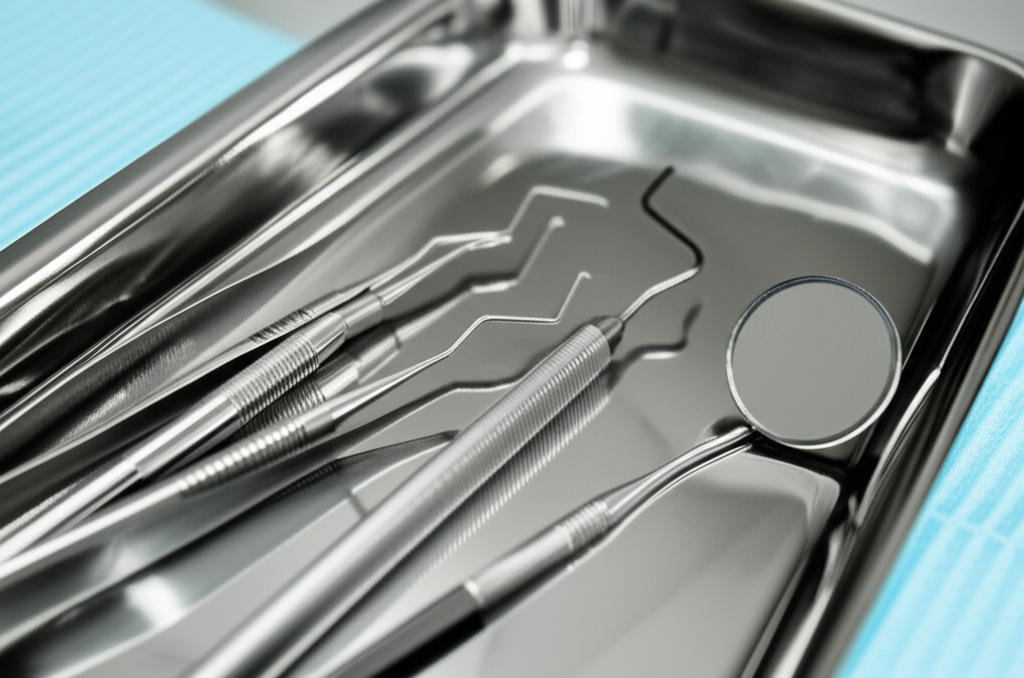
Can a Dentist “Kill” a Tooth Nerve? Understanding Dental Nerve Treatment
When you hear the phrase “kill a tooth nerve,” it can sound scary. Is it painful? Is it safe? Why would a dentist remove the nerve from your tooth at all? Understanding what really goes on during nerve treatment can help you feel better about what might happen at the dentist’s office. In this article, I’ll explain simply what tooth nerves do, root canals, and what you can expect if your dentist says your tooth nerve needs help.
Table of Contents
What Is a Tooth Nerve?
Let’s start inside the tooth. Deep in every tooth, there’s a soft place called dental pulp. This is where the tooth nerve sits with some blood vessels and other tiny parts. The nerve helps you feel hot, cold, or pain and it helps keep the tooth healthy.
What’s inside a tooth:
| Tooth Layer | What It Does |
|---|---|
| Enamel | Protects the top part |
| Dentin | Supports enamel, sends feelings |
| Pulp | Holds nerve/blood supply |
| Cementum | Covers root below gum |
| Periodontal Ligament | Connects root to bone |
The nerve is way inside, but sometimes problems can get to it—and that’s when you can feel pain.
Why Would a Dentist Remove a Tooth Nerve?
You might wonder, “Why does my dentist want to take out my tooth’s nerve?” Here’s why:
Main Reasons:
- Irreversible Pulpitis: When the inside of your tooth gets really swollen—often from deep cavities or infection—it can’t get better by itself. You might feel pain a lot, even at night.
- Deep Tooth Decay: If a cavity gets to the nerve, germs can cause infection there.
- Dental Trauma: If your tooth is cracked, broken, or hurt, the nerve may get damaged.
- Abscess Formation: When pus or infection goes under your tooth, it can make your gums puff up or hurt.
- Pulp Necrosis: The pulp has died, so the dentist needs to take it out before the infection spreads.
If you don’t fix these, you could have pain all the time, more germs, and maybe even a puffy face or bone trouble.
Quick look at why nerves come out:
| Cause | What You Might Feel |
|---|---|
| Irreversible pulpitis | Constant pain, swelling |
| Deep decay | Sensitive to sweet, hot, cold |
| Trauma (crack, break) | Pain after getting hit |
| Abscess | Swollen gums, tooth pain |
| Pulp necrosis | Tooth changes color, no feeling |
How Do Dentists “Kill” a Tooth Nerve? The Root Canal
The words “root canal” can sound scary, but really, it isn’t as bad as it sounds! This is the main way a dentist gets rid of the bad nerve.
Here’s how a root canal goes:
Did You Know? Some dentists use special microscopes to make sure they don’t miss anything inside the tooth.
> Root Canal Facts:
| Fact | What to Know |
|---|---|
| Yearly root canals in the US | Over 17 million |
| Success rate | About 90-95% |
| Common side effect | Mild pain or sore feeling after, short-term |
For details on restoring your tooth after a root canal, check out this crown and bridge lab.
Does Removing the Nerve Hurt?
This is a big worry! Tooth pain is no joke, and nobody wants more. But don’t worry—dentists will always make you numb first so you shouldn’t feel pain, maybe just a bit of pushing.
After it’s done:
- A little soreness or dull pain is pretty normal for a day or two.
- For most people, the pain is lots better once the bad nerve is gone!
- Over-the-counter pain medicine like ibuprofen usually works fine.
Tip: If you still hurt a lot after a few days, call your dentist so they can check for problems.
Is It Safe to Remove a Tooth Nerve?
Yes! Dentists and root canal experts have been doing root canals for over 100 years, and it just keeps getting easier and safer. Only the bad inside part is taken out, so the rest of your tooth is saved.
Why it’s safe:
- Numbing medicine keeps it from hurting.
- The tools are made for the job.
- New microscopes and other tools help dentists do it even better.
- Keeping things clean is super important.
And yes, it’s common. Every year, millions of people get root canals—and most of those teeth are still being used years later.
Sometimes: If the nerve isn’t fully damaged, dentists use special treatments to keep it alive—mostly for kids or small cavities.
What Happens After the Nerve Is Gone?
After your nerve is out, is the tooth “dead” forever? Not exactly:
- Tooth still works. You can eat just fine and it still looks like a normal tooth, but it won’t feel hot or cold anymore.
- No more infection. The main pain source is gone.
- Tooth not as strong. Without the pulp, your tooth can chip or break easier.
- A crown protects it. That’s why dentists like to put a crown on it to keep it safe.
If you want your fixed tooth to look real, check out lifelike crowns from this zirconia lab.
Potential Risks and Problems
Root canals are very safe, but like any procedure, problems can sometimes happen.
- Not fully cleaned: Sometimes a tiny bit of infection is left inside, causing pain later.
- Missed canal: Teeth have small channels—a dentist might miss one.
- Broken tool: One of the cleaning files may break inside the tooth (rarely).
- Tooth crack: If not fixed with a crown soon, the tooth could break.
- Long-lasting pain: Most pain goes away, but if it sticks around, see your dentist.
Good news: Most of these are rare and can be fixed if they do happen.
What If the Tooth Nerve Is Still Healthy?
Not all toothaches mean you need a root canal! Sometimes, the nerve is just irritated but still alive.
- Pulp-capping: If the cavity is close to the nerve, a special cover is used to help it heal.
- Mild pulpitis: Sometimes medicine and a simple filling help.
- Vital pulp therapy: Only a small part of the nerve is removed, the healthy part stays.
Get help early! Keeping your nerve is always best if you can.
How To Avoid Needing Nerve Treatment
Want to stay away from root canals? Prevent problems with simple care.
Easy Ways to Keep Teeth Healthy:
- Brush twice daily with fluoride toothpaste.
- Floss every day to get stuff out from between teeth.
- Cut down on sugar and snack less.
- See your dentist for checkups and cleaning.
- Wear a mouthguard if you play sports.
Need appliances like night guards or dentures? Find help from a trusted removable denture lab.
When Should You Visit the Dentist for Nerve Pain?
Don’t ignore tooth pain! If your nerve is bothering you, get it looked at soon.
See your dentist if you:
- Have tooth pain that you just can’t shake (especially at night)
- Have pain eating anything hot, cold, or sweet
- Gums are swollen or sore
- Notice a bump or “pimple” on the gums
- Tooth is turning darker
- Pain spreads to jaw or ear
Getting seen early saves teeth.
Frequently Asked Questions (FAQ)
Q: Will my tooth feel different after a root canal?
A: Not a lot! You won’t feel hot or cold anymore, but chewing and looks are the same, especially with a crown.
Q: How long does a root canal take?
A: Most take around 1–2 hours, usually in one or two visits.
Q: Can kids get root canals?
A: Yes, sometimes for baby teeth or young permanent teeth. The dentist makes sure to use kid-friendly methods.
Q: Will my tooth hurt again?
A: If the infection is completely gone and the tooth is sealed well, pain usually doesn’t come back.
Key Points To Remember
- Tooth nerves are deep inside teeth and help you feel things.
- Dentists remove nerves, usually with root canals, if they’re badly hurt or infected.
- Root canals work well and help you keep your tooth.
- The treatment is safe and not as scary as it sounds.
- After nerve removal, a crown helps your tooth last much longer.
- Don’t wait to fix tooth pain.
- Brushing, flossing, and regular dentist visits keep your nerves healthy.
- If you think your nerve is in trouble, see your dentist quickly.
- With good care and teamwork with your dentist, you can keep your smile for a long time!








